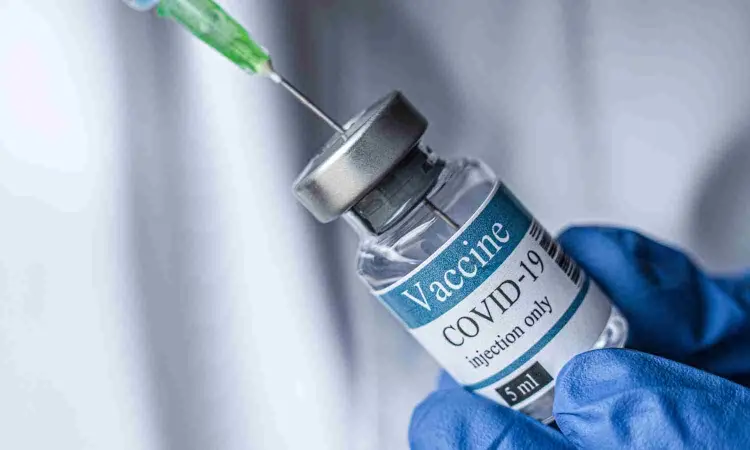- Home
- Medical news & Guidelines
- Anesthesiology
- Cardiology and CTVS
- Critical Care
- Dentistry
- Dermatology
- Diabetes and Endocrinology
- ENT
- Gastroenterology
- Medicine
- Nephrology
- Neurology
- Obstretics-Gynaecology
- Oncology
- Ophthalmology
- Orthopaedics
- Pediatrics-Neonatology
- Psychiatry
- Pulmonology
- Radiology
- Surgery
- Urology
- Laboratory Medicine
- Diet
- Nursing
- Paramedical
- Physiotherapy
- Health news
- Fact Check
- Bone Health Fact Check
- Brain Health Fact Check
- Cancer Related Fact Check
- Child Care Fact Check
- Dental and oral health fact check
- Diabetes and metabolic health fact check
- Diet and Nutrition Fact Check
- Eye and ENT Care Fact Check
- Fitness fact check
- Gut health fact check
- Heart health fact check
- Kidney health fact check
- Medical education fact check
- Men's health fact check
- Respiratory fact check
- Skin and hair care fact check
- Vaccine and Immunization fact check
- Women's health fact check
- AYUSH
- State News
- Andaman and Nicobar Islands
- Andhra Pradesh
- Arunachal Pradesh
- Assam
- Bihar
- Chandigarh
- Chattisgarh
- Dadra and Nagar Haveli
- Daman and Diu
- Delhi
- Goa
- Gujarat
- Haryana
- Himachal Pradesh
- Jammu & Kashmir
- Jharkhand
- Karnataka
- Kerala
- Ladakh
- Lakshadweep
- Madhya Pradesh
- Maharashtra
- Manipur
- Meghalaya
- Mizoram
- Nagaland
- Odisha
- Puducherry
- Punjab
- Rajasthan
- Sikkim
- Tamil Nadu
- Telangana
- Tripura
- Uttar Pradesh
- Uttrakhand
- West Bengal
- Medical Education
- Industry
COVID-19 shots linked to small increase in heart-brain conditions, reveals largest-ever COVID vaccine study

Switzerland: Researchers from the Global Vaccine Data Network, a research arm of the World Health Organization, analyzed 99 million people who received COVID-19 vaccinations across eight countries and revealed some risks associated with the shot.
According to the largest COVID-19 vaccine study to date, COVID-19 vaccines from companies like Moderna, Pfizer, and AstraZeneca were linked to rare occurrences of heart, brain and blood disorders. However, experts say the risks of COVID-19 development greatly outweigh the risks of getting vaccinated.
The researchers looked at expected versus observed rates of 13 medical conditions that were considered “adverse events of special interest” in a study population of 99 million vaccinated people in eight countries, making it the largest COVID-19 vaccine study to date.
Covid vaccines are meant to prevent severe infection, and studies have shown Pfizer-BioNTech, Moderna, and AstraZeneca’s vaccines are effective at preventing severe illnesses, hospitalizations and death.
The study, published in the journal Vaccine found that vaccine was tied to a slight increase in blood, neurological, and heart-related medical conditions, according to a press release from GVDN.
People who received certain types of mRNA vaccines were shown to have a higher risk of myocarditis, an inflammation of the heart muscle.
Some viral-vector vaccines were linked to a higher risk of blood clots in the brain, and an increased likelihood of Guillain-Barre syndrome, a neurological disorder in which the immune system attacks the nerves.
Other potential risks included inflammation of part of the spinal cord after viral vector vaccines and swelling and inflammation in the brain and spinal cord after viral vector and mRNA vaccines, the press release stated.
The key findings of the study were as follows:
- Rare cases of myocarditis were identified in the first, second and third doses of Pfizer-BioNTech’s and Moderna’s mRNA vaccines: The highest rate was seen after the second Moderna dose (6.1 times the expected rate of cases).
- Pericarditis had a 6.9-fold increased risk in those who took a third dose of AstraZeneca’s viral-vector vaccine, while a first and fourth dose of Moderna’s vaccine had a 1.7-fold and 2.6-fold increased risk, respectively.
- There was a 2.5-times greater risk of developing the rare autoimmune disorder Guillain-Barre syndrome among those who took AstraZeneca’s vaccine compared to the rate researchers expected, and a 3.2-times greater risk of getting blood clots among the same population.
- There was a 3.8-times greater risk of developing the neurological disorder acute disseminated encephalomyelitis after the Moderna vaccine was administered, and a 2.2-fold increased risk after AstraZeneca’s vaccine.
In the observational cohort study, K. Faksova, Department of Epidemiology Research, Statens Serum Institut, Copenhagen, Denmark, and colleagues compared observed expected rates of 13 selected AESI across neurological, haematological, and cardiac outcomes.
Expected rates were obtained by participating sites using pre-COVID-19 vaccination healthcare data stratified by age and sex. Observed rates were reported from the same healthcare datasets since the COVID-19 vaccination program rollout.
In conclusion, the COVID-19 vaccines from companies like Moderna, Pfizer, and AstraZeneca were linked to rare occurrences of brain, heart and blood disorders, though experts say the risks of developing COVID-19 greatly outweigh the risks of getting vaccinated.
"While our study confirmed previously identified rare safety signals after COVID-19 vaccination and contributed evidence on several other important outcomes, further investigation is warranted to confirm associations and assess clinical significance," the researchers wrote.
Reference:
Faksova, K., Walsh, D., Jiang, Y., Griffin, J., Phillips, A., Gentile, A., Kwong, J., Macartney, K., Naus, M., Grange, Z., Escolano, S., Sepulveda, G., Shetty, A., Pillsbury, A., Sullivan, C., Naveed, Z., Janjua, N., Giglio, N., Perälä, J., . . . Hviid, A. (2024). COVID-19 vaccines and adverse events of special interest: A multinational Global Vaccine Data Network (GVDN) cohort study of 99 million vaccinated individuals. Vaccine. https://doi.org/10.1016/j.vaccine.2024.01.100
Dr Kamal Kant Kohli-MBBS, DTCD- a chest specialist with more than 30 years of practice and a flair for writing clinical articles, Dr Kamal Kant Kohli joined Medical Dialogues as a Chief Editor of Medical News. Besides writing articles, as an editor, he proofreads and verifies all the medical content published on Medical Dialogues including those coming from journals, studies,medical conferences,guidelines etc. Email: drkohli@medicaldialogues.in. Contact no. 011-43720751


